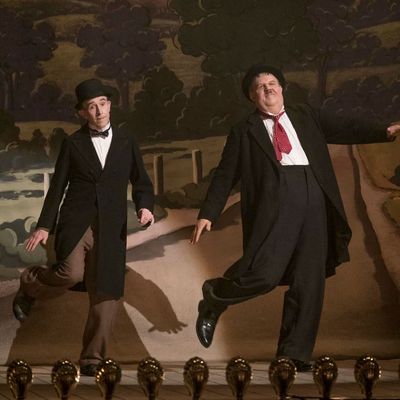
For one reason or another, I’ve seen a lot of vaudeville in movies this year — both recent and old releases. I have started to feel as though any depiction of this bygone working-class, workaday theater tradition isn’t real to me without a little sweat — figurative and literal. Vaudeville’s inherent sweatiness is the only thing that can connect us to an otherwise completely alien comic sensibility and aesthetic; the sweatiness is what it shares with Elvis or Mariah or any given YouTube star. (Vaudeville is a direct ancestor of YouTube and Vine, obviously.)
There are buckets of sweat in Stan & Ollie, an otherwise pretty antiseptic late-career biopic that follows a UK comeback tour of Stan Laurel and Oliver Hardy, well past their prime. The setup would suggest a nearly unbearable display of slow-melting pathos, and while director Jon Baird does give us some of that, it’s hard to feel too terribly sad watching the cannily cast Steve Coogan and John C. Reilly as the graying duo. This is too sunny a production to linger too long in the dark corners; even Laurel’s alcoholism is treated with a light touch when it comes up. Nevertheless, it still finds its way to some kind of profundity about the nature of long-term working relationships, something a little more complicated than the mere idea that the show must go on (which it must, and does — hence the sweat).
The film, sensitively if didactically written by Philomena screenwriter Jeff Pope, appears to depict a kind of mashup of two historical tours: one UK tour in 1947, during which time they were trying to get funding for a new Robin Hood movie with a British production company, and another in 1953, which culminated with a heroes’ welcome in Cobh, Ireland. The prologue starts some 14 years earlier, with the duo making the fateful decision to part ways with longtime producer Hal Roach in order to have more creative autonomy — but their move to 20th Century Fox is less than smooth, and creates a lasting fissure between the two. Now, trundling from one half-empty small-town music hall to another, the duo tries to regain some of that old magic and turn themselves into a bankable concern once more. They’re successful to a point, but there’s an unspoken pain between them that is politely stepped around until it erupts to the foreground during a high-profile stop in London.
At one point their wives, Ida Lauren (Nina Arianda) and Lucille Hardy (Shirley Henderson), join up with them, and I was delighted to realize that tucked away in this cute BBC production were two of the better depictions of protagonists’ wives I’ve seen at the movies in recent years. Arianda and Henderson are both great, but they also have an interesting, somewhat spiky, but ultimately sympathetic relationship with each other, which plays out in numerous scenes while the two wait around for their famous, constantly mugging and photo-popping husbands. The toll that show business takes on such relationships and on Laurel and Hardy’s relationship with each other is never hit on the head, but feels real nevertheless.
Accordingly, the film’s darkest moment arrives in the postscript subtitle, right before the credits roll, when we learn how the workaholic Laurel spent his final years. There’s a moment during their big London altercation when Ollie calls Stan, who was never not coming up with bits, “an empty man.” In the midst of all the slapstick and PR gags and general good-natured pandering, it’s a shot that hurts. Hardy, with his jowly girth and fatal heart condition, may have physically been the sweatiest of the two, but that postscript note is proof that sweatiness is a state of mind.

